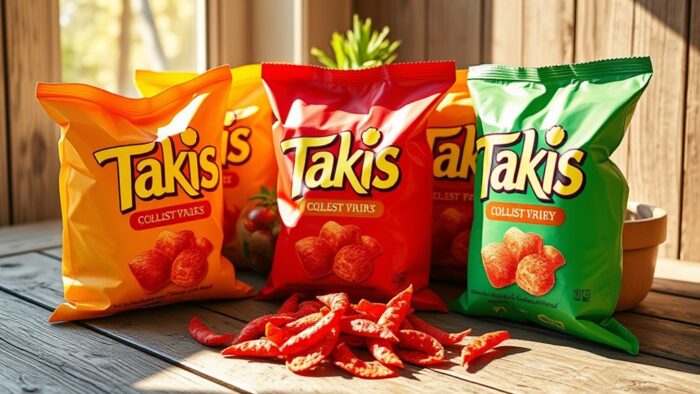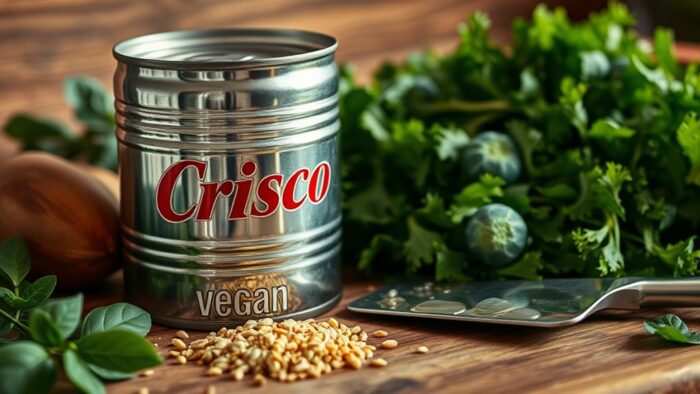Are Oreos Vegan?
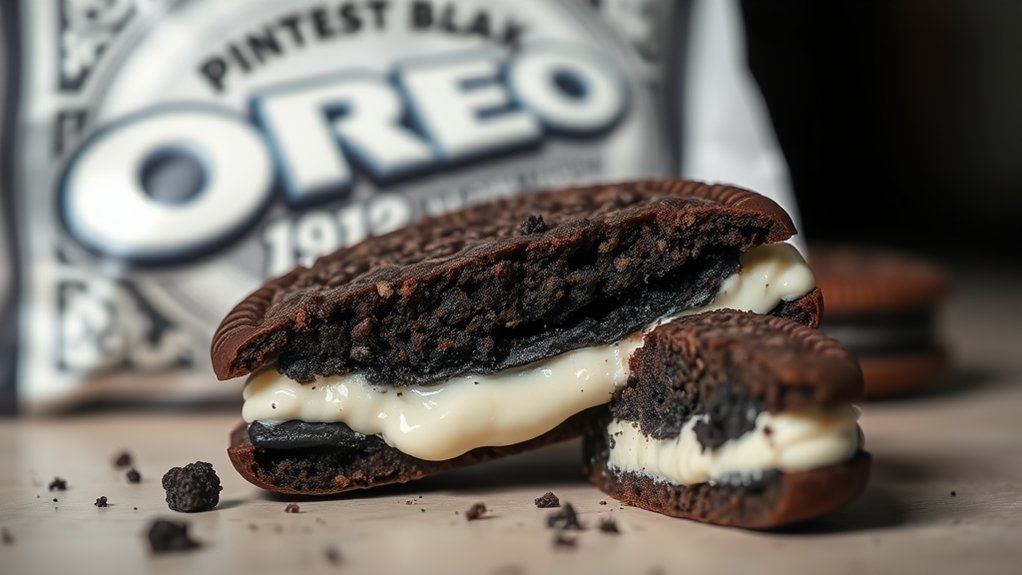
Are you wondering if Oreos fit into your vegan lifestyle? You’re not alone! Many people are curious about whether this popular cookie can be part of their plant-based diet. It’s important to know what goes into the foods we eat, especially when it comes to dietary restrictions and allergies.
Classic Oreos are often seen as a go-to snack for vegans because they mainly consist of plant-based ingredients. However, there’s a caveat: the packaging warns of potential cross-contamination with dairy. This means that while many vegans enjoy Classic Oreos, those with severe allergies might want to tread carefully. Plus, not all Oreo flavors are created equal—some may contain non-vegan ingredients.
If you’re eager to learn more about what makes Oreos a potential fit (or not) for your diet, stick around! There’s much more to uncover about these beloved cookies.
The History of Oreo Cookies
The Oreo cookie has an interesting history that began in 1912 when it was introduced by the National Biscuit Company, known today as Nabisco. The original Oreo featured a distinct wreath-like design and quickly became popular due to its unique flavor profile.
In the 1990s, Nabisco made a significant change to the Oreo recipe, replacing lard with partially hydrogenated vegetable oil. This adjustment not only made Oreos suitable for vegetarians but also paved the way for the creation of vegan alternatives.
Today, Oreo cookies come in a wide range of flavors, including gluten-free options, which cater to various dietary needs and preferences. Despite these innovations, the classic Oreo remains a favorite among consumers.
Interestingly, many people consider classic Oreos to be “accidentally vegan” because they’re made with plant-based ingredients. However, it’s worth noting that they’re produced in facilities that may also process dairy products, which is an important consideration for those with strict dietary restrictions.
Are Oreos Vegan?

Are Oreos vegan? This is a common question among those following a vegan lifestyle, especially given the cookie’s popularity. Classic Oreos are often considered accidentally vegan because their primary ingredients, such as sugar and soy lecithin, are derived from plants.
However, it’s important to note that the packaging indicates a potential risk of cross-contamination with milk. This warning may be a concern for strict vegans who avoid any trace of animal products.
Most people who follow a vegan diet do accept Classic Oreos, and there are various flavors available, including Gluten-Free and Mint.
However, it’s crucial to read the labels carefully. Some variations, like Fudge-Covered Oreos or limited-edition flavors such as Oreo Under the Tuscan Sun, contain ingredients that aren’t vegan-friendly.
To assure that your snack aligns with your dietary preferences, always check the ingredient list and any allergen warnings. This will help you make informed choices while enjoying your favorite treats.
Ingredients Analysis for Vegan Compliance

When assessing the ingredients of Oreos for vegan compliance, it’s important to note that many of the components are indeed plant-based. The classic Oreo is made from ingredients like sugar, soy lecithin, and unbleached wheat flour, all of which fit well within a vegan diet.
In the 1990s, the recipe was updated to replace lard with partially hydrogenated vegetable oil, making it more suitable for vegans.
While the packaging indicates that Oreos “may contain milk,” this statement is generally considered acceptable by many vegans according to The Vegan Society’s guidelines, as it refers to cross-contamination rather than direct ingredients.
However, it’s always wise to check the labels, especially for variations like Fudge-Covered Oreos, which may include animal-derived ingredients.
In summary, if you’re enjoying a classic Chocolate Sandwich Oreo, you can feel confident that it aligns with vegan principles.
Always keep an eye on the packaging for any updates or changes in ingredients, but overall, Oreos are a treat that many vegans can enjoy.
Sugar Processing Methods and Vegan Considerations

When thinking about whether Oreos are genuinely vegan, it’s important to look into how the sugar is processed, especially since some methods, like using bone char, can be a concern for many.
Even though Oreos don’t list any animal-derived ingredients, this aspect can lead to some ethical questions.
It’s helpful to understand vegan certification standards to better guide the discussions around Oreos and why they’re often labeled as “accidentally vegan.”
Speaking of vegan considerations, let’s look into some other popular snacks and their ingredients to see how they measure up.
Sugar Sourcing Practices
Sugar sourcing practices are essential to understand, especially when evaluating whether Oreos fit within vegan guidelines. While many people consider Oreos to be “accidentally vegan,” the sugar used in these cookies can be a point of contention. This is primarily due to the possibility that the sugar has been processed with bone char, a method that poses concerns for those adhering strictly to vegan principles.
To direct this issue, it’s important to be aware of the types of sugar available. Some manufacturers provide alternatives that are ethically sourced and don’t involve animal-derived products. However, the sourcing practices can vary significantly by brand and geographic location.
To assure you’re consuming sugar that aligns with vegan values, look for products that are labeled as vegetarian or vegan. Labels indicating organic or specifically vegan-friendly sugars can help you steer clear of those processed with bone char.
Additionally, reaching out to manufacturers for clarification on their sugar sourcing practices can provide peace of mind. By staying informed and making thoughtful choices, you can enjoy Oreos and other treats while remaining true to your vegan lifestyle.
Bone Char Usage
Understanding how sugar is processed can help clarify why bone char is a concern for many vegans when it comes to products like Oreos. Bone char is a substance that’s sometimes used in the sugar refinement process to filter and bleach sugar. However, since it’s derived from animal products, this raises ethical issues for those who follow a strict vegan lifestyle.
While Oreos are made with plant-based ingredients, the sugar used in them may be processed with bone char, which complicates their classification as vegan-friendly. In the United States, this method is quite common, whereas other countries often use alternative processes that don’t involve animal products and align more closely with vegan principles.
Another issue is the lack of transparency in vegan labeling. Many manufacturers don’t specify how their sugar is sourced on product labels, making it difficult for consumers to make informed choices.
The Vegan Society, for instance, advises against consuming sugar processed with bone char, which can influence many vegans to avoid Oreos, despite their otherwise plant-based ingredient list.
It’s important for consumers to be aware of these processing methods and to consider how they align with their dietary choices. By understanding the nuances of sugar processing, particularly the implications of bone char, you can make more informed decisions about the products you choose to consume.
Vegan Certification Standards
When it comes to understanding vegan certification standards, it’s important to recognize that not all products labeled as plant-based are strictly vegan. This is particularly true for sugar processing methods, as some sugars may be refined using bone char, which doesn’t comply with stricter vegan standards. This complicates matters for products like Oreos, which some vegans choose to consume despite this concern.
As the interest in vegan lifestyles continues to grow, knowing the details behind these certifications becomes essential for those following a plant-based diet. The Vegan Society allows for some degree of cross-contamination, meaning that many vegans may be comfortable eating Oreos, even if there are potential traces of dairy present.
To make informed choices, it’s crucial to check product labels for any updates on ingredients and processing methods. Additionally, considering the source of sugar can provide clarity on whether a product meets your vegan standards.
This careful attention to detail reflects a commitment to ethical eating and helps make sure that your choices align with your values. By staying informed, you can guide the complexities of vegan certifications and make decisions that suit your lifestyle.
Cross-Contamination Risks With Dairy
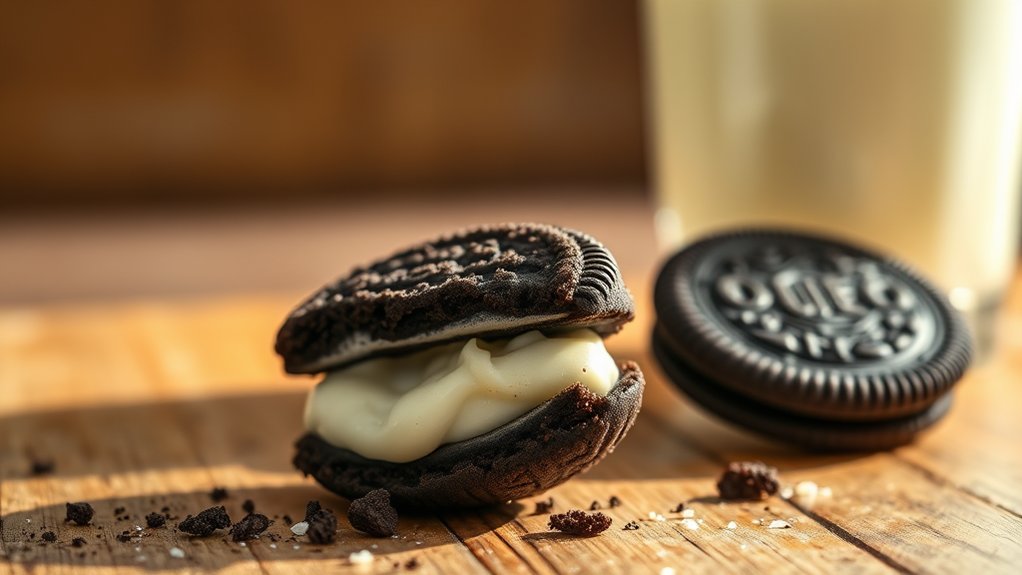
When it comes to Oreos, it’s important to be aware of the possibility of dairy cross-contamination. The packaging mentions that they “may contain milk,” indicating that they’re made in facilities that also process dairy products.
While some vegans may feel comfortable with this risk according to The Vegan Society’s guidelines, those with severe allergies should definitely reach out to Nabisco for more information.
Speaking of dietary restrictions, let’s take a look at other snack options that might be safer for those with allergies or specific dietary preferences.
Dairy Cross-Contamination Concerns
Oreos are known for their plant-based ingredients, but dairy cross-contamination is an important consideration for many consumers. The packaging of Oreos states that they “may contain milk,” which reflects the potential for cross-contact during manufacturing. This is particularly relevant since Oreos are produced in facilities that also handle dairy products, meaning that trace amounts of milk could inadvertently be included in the final product.
For individuals following a vegan lifestyle, Oreos might be seen as “accidentally vegan,” allowing them to enjoy this treat despite the risk of dairy contamination. However, for those with severe dairy allergies, it’s crucial to take this warning seriously. Even small amounts of dairy can trigger allergic reactions, making it essential to be cautious.
If you have lactose intolerance or a milk allergy, staying informed about potential cross-contamination is vital for your health and safety. It’s a good practice to reach out to the company directly for more information about their manufacturing processes and allergen control measures.
This proactive approach can help confirm that your dietary choices remain safe and aligned with your health needs. By understanding the potential for dairy cross-contamination in products like Oreos, you can make well-informed decisions that suit your lifestyle.
Vegan Society Guidelines
Understanding the Vegan Society’s guidelines is essential for anyone directing the intricacies of vegan product labeling, particularly regarding potential cross-contamination with dairy.
For instance, while classic Oreos are crafted from plant-based ingredients, they’re labeled with a “may contain milk” warning. This is due to the possibility of cross-contamination in the manufacturing process, as these cookies are produced in facilities that also handle dairy products.
This detail underscores the significance of ingredient sourcing for those following a vegan diet. The Vegan Society does allow for products that may contain traces of animal-derived ingredients, which is why many vegans consider Oreos acceptable.
However, if you adhere to a strictly vegan lifestyle or have specific dietary restrictions, it’s advisable to stay informed. Contacting manufacturers for comprehensive allergen information can help you make choices that align with your dietary preferences.
Country-Specific Oreo Variations
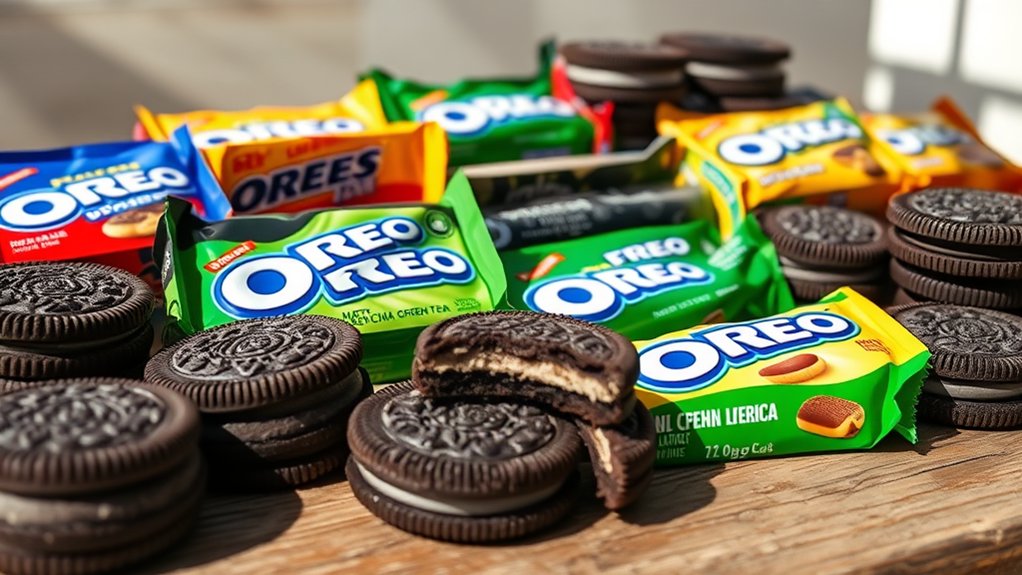
When looking into the world of Oreos, it’s important to recognize that the formulations can vary significantly from one country to another. These differences can affect whether a specific Oreo is suitable for vegans. For example, some Oreo flavors available in the UK may contain dairy ingredients that aren’t present in the American versions. This variation means that it’s crucial to carefully check ingredient lists before making a purchase.
Additionally, ingredient labeling practices differ by region, so always look for local packaging that may indicate vegan certifications or allergen warnings. In some countries, exclusive Oreo flavors or limited-edition varieties may include animal-derived components, underscoring the need for awareness of local formulations.
If you’re seeking gluten-free or vegan options, be aware that these alternatives may also vary by region. Therefore, understanding the specific ingredients and certifications for Oreos in your area is essential for making informed choices.
Popular Vegan Alternatives to Oreos

If you’re in search of vegan alternatives to Oreos, there are plenty of tasty options available that also cater to various dietary preferences, including gluten-free choices.
Brands like Back to Nature and Vegan Bakery offer some great sandwich cookies, while 365 Whole Foods Market has palm oil-free options for those who are more health-conscious.
Trying out these alternatives can really increase your vegan cookie selection without compromising on flavor or quality.
Speaking of alternatives, let’s take a look at some creative vegan dessert recipes that you can easily whip up at home.
Other Vegan Sandwich Cookies
If you’re on the lookout for vegan sandwich cookies, there are several tasty alternatives to choose from. Back to Nature’s Classic Creme Cookies are a popular option, while Vegan Bakery’s Cookies n Cream is both certified vegan and gluten-free, making it suitable for a variety of dietary needs.
If you’re avoiding palm oil, consider the Chocolate Sandwich Cremes from 365 Whole Foods Market, which are a great choice.
For those who care about sustainability, Gato offers a Cookies n Cream variety that comes in eco-friendly packaging. Additionally, brands like Newman Os and certain Lotus Biscoff cookies are typically dairy-free, making them good substitutes for traditional sandwich cookies.
Don’t forget to check your local grocery store’s brand options; many store brand sandwich cookies are also dairy-free. Just be sure to read the labels to verify that the ingredients align with your vegan lifestyle.
With these options, you can enjoy delicious sandwich cookies without compromising your dietary choices.
Gluten-Free Cookie Options
For individuals following a vegan lifestyle and seeking gluten-free cookie options, there are several brands that provide tasty alternatives to traditional Oreos. Nabisco offers certified gluten-free Oreo Cookies in three varieties, all of which are dairy-free, making them suitable for those with gluten and dairy restrictions.
In addition to Oreos, brands like Back to Nature and Gato produce vegan-friendly cookies such as Classic Creme Cookies and Cookies n Cream, respectively. Other noteworthy options include Newman Os and various store-brand sandwich cookies that often meet vegan criteria.
It’s essential to check the labels to confirm their suitability for your dietary needs. Kinnikinnick and Mi-Del also offer gluten-free sandwich cookies that align with a dairy-free diet, expanding the choices available for those seeking satisfying snacks.
Notably, Nabisco’s introduction of gluten-free Mint Creme Oreos showcases their commitment to innovation in the gluten-free market, providing more options for consumers looking for delicious vegan treats.
Whether you’re looking for a sweet snack or a dessert alternative, these gluten-free and vegan cookie options make certain you can enjoy a tasty treat without compromising your dietary preferences.
Certifications and Labeling for Vegan Products

Directing certifications and labeling for vegan products can be a bit challenging, but with the right knowledge, consumers can make informed choices. Start by looking for reputable plant-based certifications. These certifications confirm that the product contains no animal-derived ingredients, giving you confidence in your purchase.
While vegan labels can add an extra layer of assurance, it’s important to examine the packaging closely. For instance, many Oreo flavors are technically dairy-free based on their ingredients, but they carry a “may contain milk” warning. This indicates potential cross-contamination, which may be a concern for those who adhere strictly to a vegan diet.
Ingredient transparency plays a vital role in your decision-making process. Always take the time to check for any updates or changes in product formulations, as manufacturers can alter ingredients.
If you’re uncertain about a product’s allergen safety, don’t hesitate to reach out to the company directly for clarification. By taking these proactive steps, you can align your purchases with your vegan lifestyle and make choices that reflect your values.
Consumer Feedback on Vegan Oreo Options

The growing availability of vegan Oreo options has garnered positive feedback from consumers, reflecting a shift in preferences toward more inclusive and allergen-friendly snacks. Many people are pleasantly surprised to discover that classic Oreos are already vegan due to their plant-based ingredients, which has contributed to their popularity among those seeking vegan treats.
Here are three important insights from consumer feedback regarding vegan Oreo options:
- Diverse Flavor Options: The introduction of new flavors, such as Gluten-Free Mint Creme Oreos, showcases the brand’s commitment to innovation and catering to a variety of taste preferences. This diversity not only boosts the snacking experience but also opens up opportunities for those looking to look into different flavors without sacrificing dietary needs.
- Dietary Inclusivity: The availability of certified gluten-free and dairy-free Oreos has been well-received, especially by individuals with dietary restrictions. This inclusivity make certains that more consumers can enjoy these treats without worrying about their dietary limitations, thereby expanding the market for allergen-friendly snacks.
- Cross-Contamination Concerns: While many vegans appreciate Oreos, there are ongoing concerns regarding potential cross-contamination with non-vegan ingredients during manufacturing. This highlights the importance of allergen awareness in product development and the need for transparent labeling, which can help consumers make informed choices.
Overall, the feedback on vegan Oreo options emphasizes the importance of responsiveness to consumer needs and the significance of providing clear information about ingredients and manufacturing practices.
The Impact of New Product Releases on Vegan Perception

As more consumers look for vegan options, the introduction of new products can significantly influence how brands are perceived within the vegan community. For example, the recent release of “Oreo Under the Tuscan Sun” raises important questions about Oreo’s commitment to vegan-friendly offerings, as this flavor includes meat-based ingredients.
For many, Oreos have long been considered a reliable vegan snack, so this change may lead to a loss of brand loyalty among plant-based consumers.
The packaging of this new product, which features a cow while promoting non-greenhouse gas emissions, adds confusion to the brand’s messaging. This misalignment could result in disappointment among vegan consumers, potentially harming Oreo’s reputation and affecting sales.
Brands like Oreo face a crucial challenge: balancing innovation with the values of their consumers. As they guide this landscape, it’s essential for them to consider the implications of their product offerings on consumer trust and brand loyalty.
